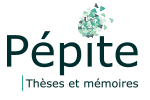Impact de l’anticoagulation préventive post-mastectomie : analyse de la base nationale du PMSI
- Preventive anticoagulation
- breast cancer
- mastectomy
- thromboembolic event
- hemorrhage
- Sein -- Cancer
- Mastectomie
- Thrombose
- Anticoagulants
- Traitement anticoagulant
- Programme de médicalisation des systèmes d'information
- Tumeurs du sein
- Mastectomie
- Complications postopératoires
- Embolie et thrombose
- Anticoagulants
- Langue : Français
- Discipline : Médecine. Anesthésie Réanimation
- Identifiant : 2020LILUM489
- Type de thèse : Doctorat de médecine
- Date de soutenance : 23/10/2020
Résumé en langue originale
Objectives : Breast cancer surgery is an important risk factor for thromboembolic events. Many studies have been carried out finding very moderate incidences ranging from 0 to 0.8% over a 30-day period. Many authors question the value of preventive anticoagulation in this case. The principal objective is to study the impact of preventive anticoagulant medication in terms of readmission for bleeding or thrombosis. Material and Methods: A survey of practices during the 2008-2014 period was carried out among cancer centers in France. We reused historical medical-administrative data about inpatient stays from the PMSI database. We included all female patients who were admitted for mastectomy in France from January 1, 2008 to December 31, 2014. In readmission inpatient stays, we searched for pulmonary embolism (ICD-10 code: I26), Deep Vein Thrombosis (I80), and hemorrhagic events (T810). Results: We surveyed 16 cancer centers and we created two groups: the “restrictive anticoagulation” group and the “liberal anticoagulation” group. The descriptive analysis included 62,823 patients. Outpatient care has been used for 10,096 (16.07%) patients. The proportion of outpatient surgical care significantly increased over time (from 5,06% in 2008 to 29,8% in 2014, p=0). The median length of stay was 3 days (Q1-Q3: [3; 5]). The readmission-free survival rate was 88.6% [88.3; 88.8] at 30 days, 63.4 [63.1; 63.8] at 90 days, and 48.3 [47.9; 48.7] at one year. The 90 day follow up was done for 60492 patients. In response to the principal objective, the proportion of readmission within 90 days for thrombosis or hemorrhage, was 1.86% in the “restrictive anticoagulation” group, and 2.17% in the “liberal anticoagulation” group (p=0.007). Conclusion: This study observes that a restrictive anticoagulation protocol in case of partial or total mastectomy is associated with slightly fewer readmissions for hemorrhagic or thrombotic event.
Résumé traduit
...
- Directeur(s) de thèse : Chazard, Emmanuel
AUTEUR
- Lestrade, Victor


